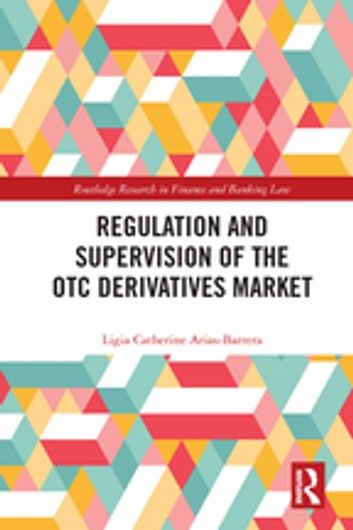| FindBook |
有 1 項符合
Regulation and Supervision of the OTC Derivatives Market的圖書 |
 |
Regulation and Supervision of the OTC Derivatives Market 作者:Ligia Catherine Arias-Barrera 出版社:Taylor & Francis 出版日期:2018-05-11 語言:英文 |
| 圖書館借閱 |
| 國家圖書館 | 全國圖書書目資訊網 | 國立公共資訊圖書館 | 電子書服務平台 | MetaCat 跨館整合查詢 |
| 臺北市立圖書館 | 新北市立圖書館 | 基隆市公共圖書館 | 桃園市立圖書館 | 新竹縣公共圖書館 |
| 苗栗縣立圖書館 | 臺中市立圖書館 | 彰化縣公共圖書館 | 南投縣文化局 | 雲林縣公共圖書館 |
| 嘉義縣圖書館 | 臺南市立圖書館 | 高雄市立圖書館 | 屏東縣公共圖書館 | 宜蘭縣公共圖書館 |
| 花蓮縣文化局 | 臺東縣文化處 |
|
|
The over-the-counter (OTC) derivatives market has captured the attention of regulators after the Global Financial Crisis due to the risk it poses to financial stability. Under the post-crisis regulatory reform the concentration of business, and risks, among a few major players is changed by the concentration of a large portion of transactions in the new market infrastructures, the Central Counterparties (CCPs).
This book, for the first time, analyses the regulatory response of the United Kingdom and the United States, the two largest centres of OTC derivatives transactions, and highlights their shortcomings. The book uses a normative risk-based approach to regulation as a methodological lens to analyse the UK regime of CCPs in the OTC derivatives market. It specifically focuses on prudential supervision and conduct of business rules governing OTC derivatives transactions and the move towards enhancing the use of central clearing. The resulting analysis, from a normative risk based approach, suggests that the UK regime for CCPs does not fulfil what would be expected if a coherent risk based approach was taken.
Our comments on the Dodd-Frank Act highlight that the incoherent adoption of risk-based approach to regulation affects the effectiveness of the US regime for CCPs. Such a regime does not follow the pace of events of ‘innovation risk’; in particular, the foreseeable changes FinTech will bring to the OTCDM and central clearing services. The second inadequacy of the US regime concerns the dual regulatory structure of the CFTC and the SEC, and the inadequate adoption of different and not well-coordinated regulatory strategies. We also analyse the cross-border implications of the US regime for non-US CCPs that provide clearing services to US market participants. Finally, we study the negative effects of the absence of a clearly defined resolution regime for CCPs.
|











